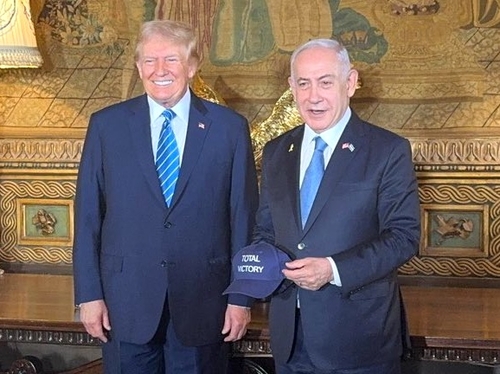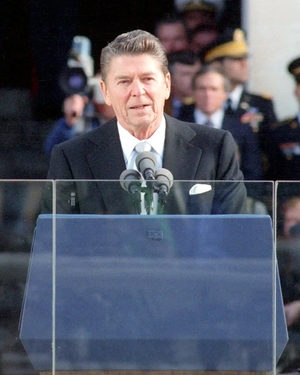The ceasefire agreement between Israel and Hamas announced on Jan. 15 has implications nearly as momentous as the Oct. 7, 2023, massacre that precipitated it.
The deal comes after fifteen months of protracted indecision by the government of Israel, during which Jerusalem followed two contradictory policies toward Hamas: Destroy the organization. Make a deal with it.
The first policy, victory over Hamas, clearly appealed more to Israel's Prime Minister Benjamin Netanyahu. By my informal count, he mentioned "victory" 216 times in 76 discreet statements, from the immediate aftermath of Oct. 7 to lighting the Hanukkah candles three weeks ago. At times, as in a statement on French television, his sentences amounted to a barrage of victory talk: "Our victory is your victory," he said. "Our victory is the victory of Israel against antisemitism. It is the victory of Judeo-Christian civilization against barbarism. It is the victory of France."
Nor did Netanyahu just seek plain victory. He spoke variously of "absolute victory," "clear victory," "complete victory," "decisive victory," "full victory," and "total victory," Of these formulations, "total victory" led the pack, mentioned 81 times and showcased via a "Total Victory" baseball cap during a visit with former president Donald Trump.
 In retrospect, an ironic photograph of Trump and Netanyahu with a "Total Victory" baseball cap. |
Internal Israeli debates confirmed Netanyahu's preference for victory. For example, he banged on the table and told off his national security team, according to Israel's Channel 12: "You are weak. You don't know how to run a tough negotiation." An informed source concluded, "He has given up on the hostages."
But, simultaneously, Netanyahu came under enormous pressure to negotiate with Hamas for the release of Israeli hostages, and thereby implicitly to permit the jihadi organization to survive. In agreeing to haggle with Hamas, Netanyahu heeded two powerful lobbies, one foreign, one domestic.
Internationally, governments keenly sought a hostage deal, either because they sympathized with Hamas or because they feared a conflagration across the Middle East. Institutions such as the United Nations and the International Criminal Court manifested the wide hostility toward Israel. Even friendly governments worried that fighting already encompassing Iran, Syria, Lebanon, Jordan, the West Bank, Gaza, Saudi Arabia, the Red Sea, and Yemen would further expand, perhaps dragging in their own forces, with ominous consequences.
Meanwhile, a domestic lobby pressured the government to make the return of hostages the paramount goal. Lobby members emoted, marched, and engaged in various forms of political theater, winning public opinion in the process. Polls consistently showed a massive majority prioritizing hostages over victory. One poll in October found 77 percent of Israelis saying the "main goal" of the war in Gaza should be to bring the hostages home and 12 percent say it must be to topple Hamas. A month later, another poll reported 69 percent deeming a hostage deal "more important" and 20 percent calling to continue the war until victory.
Politicians jumped on the bandwagon, with Israel's President Isaac Herzog declaring that "There is no greater moral, human, Jewish, or Israeli obligation than to bring our sons and daughters back to us." Military leaders legitimized this sentiment. Maj. Gen. (res.) Noam Tibon announced that "The release of all hostages is the supreme mission of the war, before any other mission! And at the top of our priorities." Maj. Gen. (res.) Amos Gilad went further: "No victory is possible over Hamas if it later turns out that not everything possible was done to retrieve them. An exchange is a matter of national security."
 Maj. Gen. (res.) Noam Tibon: "The release of all hostages is the supreme mission of the war, before any other mission!" |
Former Israel Defense Forces chief of staff Benny Gantz stated that "The hostages must be returned, even at a very heavy price." IDF spokesman Daniel Hagari added that "We will do everything, everything, to bring all the hostages home" and "We remain committed to one central war objective – the return of the 109 hostages."
Torn between his own preference and these dual pressures, Netanyahu prevaricated for over fifteen months between victory and hostages. He ordered a military assault on Gaza that much reduced Hamas' capabilities even as he sent signed a partial ceasefire deal with it. He ordered the assassination of Hamas leader Ismail Haniyeh in Tehran while insisting that hostages remained his top concern.
Not reaching a decision allowed Netanyahu to postpone fraught choices and prevarication staved off a governing coalition collapse. In the end, however, he spurned his preference for victory in favor of the hostages and a decisive ceasefire. The complex, three-phase agreement includes many moving parts and extremely detailed provisions, such as how many and what kind of Palestinians are to be exchanged for what kind of hostage.
 The section of the Hamas-Israel agreement dealing with hostage-for-prisoner exchanges. |
In outline, it calls for the release of 33 hostages in exchange for the release of more than 1,000 Palestinians, including murderers, now in Israeli prisons; the withdrawal of Israeli troops from parts of Gaza; an increase in aid to Gaza; the return of Gazans in most of Gaza; and the opening of a border crossing to Egypt. Further, it requires that negotiations resume within 16 days of signing to work on the release of all remaining 65 or so hostages in exchange for more Palestinian prisoners released, the complete withdrawal of Israeli forces from Gaza, and a permanent end of hostilities.
In brief, as Israel Hayom's senior diplomatic and White House correspondent Ariel Kahana puts it, "Israel is, with its own hands, helping its enemy to prepare to wage war." Netanyahu obviously knows this, if only because prior exchanges have led to disaster, so why did he agree to an agreement that his own coalition partner Itamar Ben-Gvir called "horrific"?
Because he fears Donald Trump.
The president-elect stated on Jan. 7 that "all hell will break out" in the Middle East if Hamas did not release the captives it held. That seemed to mean, as vice president-elect J.D. Vance interpreted it, pressure on Hamas: "It's very clear that President Trump threatening Hamas and making it clear that there is going to be hell to pay."
But no.
 Steven Witkoff forced Netanyahu to break the Sabbath and submit to Trump's will. |
This new, aggressive approach, Ran Porat of Monash University explains, obliged Netanyahu "to recalculate his positions, seeking to appease Trump." In an unexpected irony, Sanam Vakil of Chatham House notes "the Biden administration proved unwilling to exert adequate pressure over Israel's leadership" but Trump did. Netanyahu stood up to timid President Joe Biden but acquiesced to cowboy Donald Trump.
Why did Trump push so hard for a deal? One can only speculate but I believe him inspired by the events of Jan. 20, 1981, when an airplane carrying all American hostages took off from Tehran moments after Ronald Reagan was sworn in as president, leading to an ebullient and triumphal inauguration.
 Ronald Reagan speaking at his inauguration on Jan. 20, 1981. |
He ignored, of course, the grievous future costs of his momentary success. The deal releases many hundreds of hardened Islamist criminals, now free to return to their murderous ways. It nearly assures continued Hamas rule in Gaza. It boosts Islamist morale worldwide. It humiliates the West's foremost Middle Eastern ally. It also confirms Donald Trump's inconstant, unreliable, and ego-driven foreign policy. Benjamin Netanyahu will be not the last U.S. ally humiliated by self-centered presidential demands.
Putting this error in the context of George W. Bush's over-ambition ("Mission Accomplished"), Barack Obama's shallow defeatism ("leading from behind"), and Joe Biden's geriatric passivity (the Afghanistan rout), clarifies the shambles of U.S. foreign policy over the past quarter-century.
This leads to an inescapable conclusion: allies such as Australia must reduce their dependence on Washington. This may well be a good thing. Decreased reliance on American leadership concentrates the mind, exercises unused talents, and encourages a seriousness of purpose. Thus does an incompetent America, as symbolized by the "horrific" Hamas-Israel ceasefire, push free countries more actively to determine their own futures.
Mr. Pipes (DanielPipes.org, @DanielPipes) is president of the Middle East Forum and author of the recently published Israel Victory: How Zionists Win Acceptance and Palestinians Get Liberated (Wicked Son). © 2025 by Daniel Pipes. All rights reserved.
Jan. 18, 2025 addendum: Confirming my theory above about Trump demanding an inauguration gift from Israel, or else, he said on Jan. 17, "frankly, it better be done before I take the oath of office ... we shook hands, and we signed certain documents, but it better be done." Even more directly, he threatened, "Frankly, it better be done before I take the oath of office." On Jan 18, Trump quoted himself telling Netanyahu, "Just keep doing what you have to do. You have to have — this has to end. We want it to end, but to keep doing what has to be done." He then went on a riff about respect: "The United States has to get respected again, and it has to get respected fast. But respect is the primary word that I use. If they respect us, it will hold. If they don't respect us, all hell will break out."
Plus, Witkoff is quoted telling Netanyahu, "The president has been a great friend of Israel and now it's time to be a friend back," making clear that this was a favor given to Trump, a mafia-like calling in of favors.
Jan. 20, 2025 addendum: Trump credits Witkoff for the agreement:
He's an amazing guy. I said: I got to get myself a negotiator. We have to get a good negotiator. A lot of guys are knowledgeable, but they can't negotiate. They don't have the personality or whatever. And Steve does, and Steve's a great negotiator, very successful guy, but he's our new special envoy to the Middle East for helping reach this great breakthrough, and really couldn't have been done without Steve.